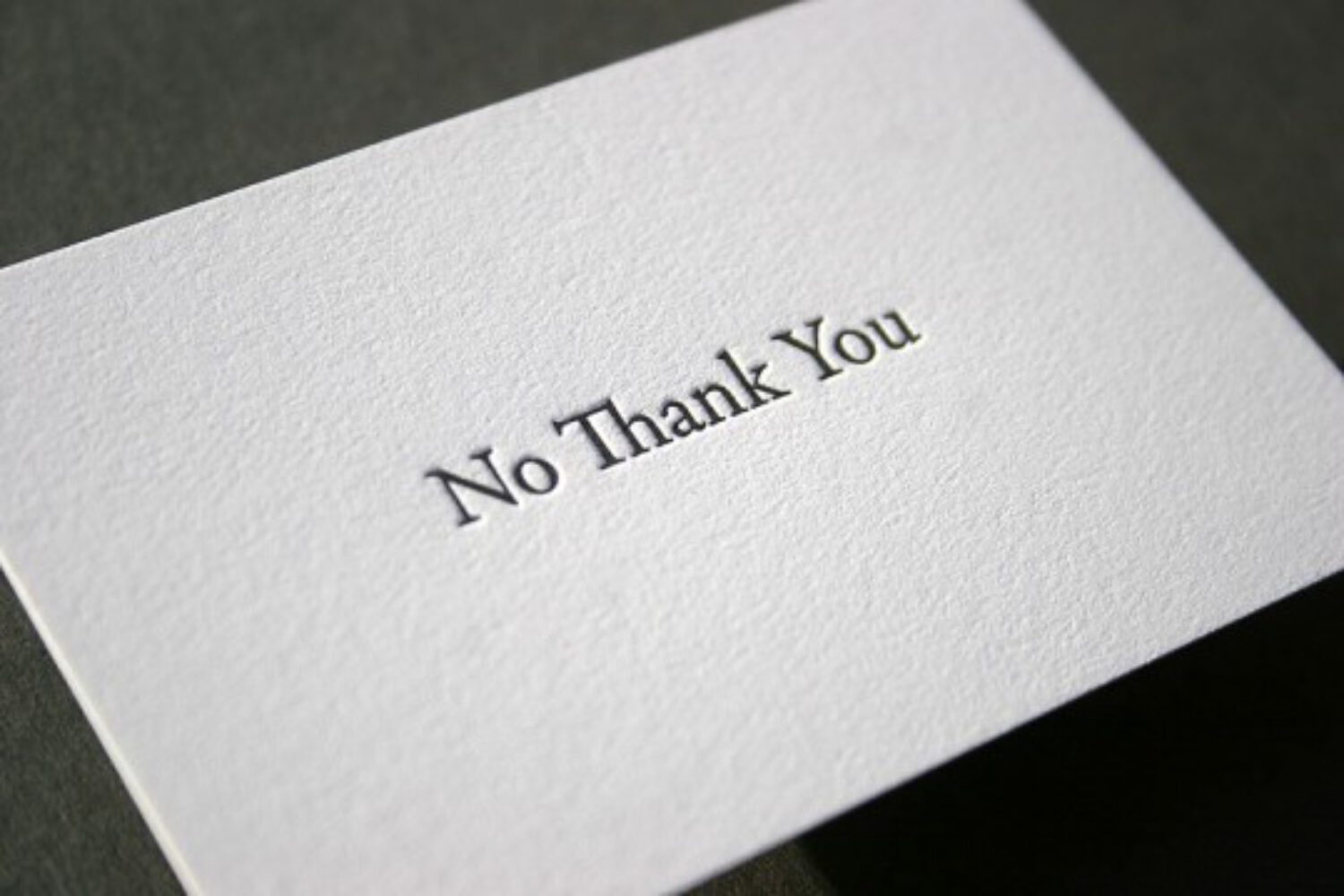From The Seven Minute Star, Step 8, Delivering Great Content:
Speakers almost always say “Thank you!” at the end of their speech. But remember: You are The Seven Minute Star! Shouldn’t the audience be thanking you for your inspiring performance? Don’t worry about being perceived as arrogant when you close without saying “Thank you.” Leaving it out actually emphasizes the final point you’ve made, while using it detracts from that point — and, I would argue, from your entire speech!
Consider this conclusion:
“In my entire life I will never forget standing in that dark room in Yad Vashem, the Holocaust Museum of Jerusalem. In the center, six eternal flames, the walls of the room made up of a never-ending number of mirrors at diverse angles. There were only six flames in that room, but what I saw was an infinite number of light dots reaching into eternity, and I knew that each and every single one of them reflected the loss of one human life. This incredible experience will follow me until my very last day…. Thank you!”
Do you see what I mean? You’d simply be smothering those powerful emotional vibes you spent so much effort to create if you say “Thank you” at the end. Why would you want to do that?
Please, please don’t say “Thank you.” Say what you have to say, then take a half-step back. That’s it; that’s all you need to do. The audience will know it’s the end, and the first movement in the crowd will be applause.


Pau
In my opinion, this topic draws too much attention.
On the one hand, you should appreciate the audience spending their time listening to you, so to thank them is completely acceptable. On the other hand, the listener might be thankful for a great speech, and might want to thank the speaker as well; but both ways are not incompatible. Both parties can thanks!!!
It’s all a matter of balance. Having the attitude that the audience should thank the speaker is arrogant to me. Being falsely modest and overstating the “thank you” to the audience is cheesy and feels uncomfortable as listener. Done with the right measure and sincerity, it can be well received and help you connect with the audience.
To wrap up, as a speaker do whatever you feel you should given the specific situation and objectives. Be authentic and avoid rules of thumb. Probably you have more to lose than to win but not giving appreciation to the other party.
Thank you for the post! 🙂
florian mueck
Thank you Pau for your sincere reply. In 6 years of Toastmasters and 3 years of doing this professionally I’ve seen so, so, so many speeches. Every time there is a great closing without the “Thank you” the impact is much bigger, the vibrations stay in the room.
There is nothing more subjective in this world than our perceptions. We all want to find our path of excellence and, for sure, we can walk many different trails to get there. I prefer the no-thank-you-trail… 😉
Craig Hadden (@RemotePoss)
I agree that the no-thank-you-trail, as you call it, is better. Where I disagree with you (and agree with Pau) is on how much emphasis should be given to whether to say thanks.
After all, if the likes of Sir Ken Robinson, Simon Sinek, and Amy Cuddy (with more than 30 million total views of their talks) can all say thanks at TED/TEDx, then we everyday speakers aren’t doing anything awful by saying it too.
Although not saying thanks makes a talk more powerful, it’s more constructive and helpful to advise speakers to end with their potent conclusion, rather than to advise not to do something. (Otherwise, for one thing, people often end up with far worse closings, like just adding “Mr Toastmaster!”)
Please check out my post called Toastmasters say “Don’t thank your audience”, I say “Why not?” It looks at the pros and cons of both saying and not saying thanks. And for a balanced discussion, I’ve also added a link to your post (and a couple of other people’s) at the end.
Jatinder
I guess the discussion on why a speaker should express THANKS at the end of a Talk is futile. Most speakers do it anyway. But it is also true that it becomes a boring routine, if the gratefulness of the attntion of the audience is stated as a THANKS, or TAHNK YOU FOR YOUR ATTENTION, etc. Having spoken around the world on varied topics (I am an Indian scientist, now retired, and have given over 400 seminars out of which about 150 were in labs in North America, Europe, Japan, China, Russia, Taiwan, S. Korea, Israel, etc.), I too have felt the need to express it in refreshing ways. One was to show, at the end of my Talk, a cartoon where 90% of the audience during a lecture is asleep, with a caption: Thanks for your ATTENTION. This gets an instant laugh from the audience. It doesn’t affect the response to my Talk, which is already over. The second one I had tried, particularly in France, is to state at the end of my talk: “c’est ça”, meaning THAT’S IT!
But, why not state: “That’s all I had to say, and I will be glad to respond to any questions that you may have.”
Prof. J.V. Yakhmi
fm
Thanks for your great comment. For me, it is a simple question: Do you want to create goose bumps at the end of your talk? If so, the “drainpipe” is a much better option. See more: http://www.florianmueck.com/2012/05/30/what-is-your-drainpipe/ – One could argue that it is OK to combine the drainpipe with the final Thank you. I disagree. It takes away the magic. I have not yet met any audience that missed a Thank you, when it wasn’t there. 😉